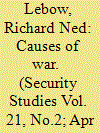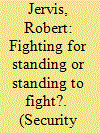|
|
|
Sort Order |
|
|
|
Items / Page
|
|
|
|
|
|
|
| Srl | Item |
| 1 |
ID:
113340


|
|
|
| 2 |
ID:
113337


|
|
|
| 3 |
ID:
113334


|
|
|
|
|
| Publication |
2012.
|
| Summary/Abstract |
There is a large literature on the impacts of explicit threats on the outcomes of crises between states, but the longer-term impacts of threats on dyadic state relationships and on international outcomes have been much less studied because of the difficulty of establishing causal connections between events separated in time. By comparing nearly identical foreign policy contexts before and after the Austrian Crimean War ultimata to Russia, this article demonstrates that, contrary to the prevailing view in much of the international relations literature, such long-term effects are not marginal ones that theoretical simplification with the goal of analyzing the central tendencies of the international system can usefully ignore. Under conditions discussed below, when a state is threatened in a way that attempts to deny one of its key policy objectives, that state will be less likely to come to the aid of the threatening state in the future and more likely to join the other side in future wars, realign its alliance commitments, and adopt strategies to drain the resources of the threatening state. Among the implications of these findings are that policymakers should take greater account of the long-term consequences of aggressive negotiating stances than current theories imply and that scholars have underestimated the information conveyed by private threats in crisis bargaining.
|
|
|
|
|
|
|
|
|
|
|
|
|
|
|
|
| 4 |
ID:
113338


|
|
|
| 5 |
ID:
113333


|
|
|
|
|
| Publication |
2012.
|
| Summary/Abstract |
This paper presents "strategic hedging" as a way to conceptualize much of the strategic behavior currently employed by second-tier states like China, Russia, Brazil, and France. Hedging is an alternative to strategies like balancing, bandwagoning, and buck-passing. Like those other strategies, hedging is driven by structural incentives associated with the current polarity of the international system and power concentration trends within it. Hedging will be most prevalent in international systems that are defined by a leading state that, while in a position of power preponderance, is also in the process of relative decline. Strategic hedging behavior is effective for second-tier states in such deconcentrating unipolar systems because it avoids outright confrontation with the system leader in the short term, while still increasing the hedging state's ability to survive such a direct military confrontation should it occur in the long run. Strategic hedging behavior can also be used to insure the hedging state against security threats that might result from the loss of public goods or subsidies that are currently being provided by the system leader. In this article, I define strategic hedging behavior, present a mechanism for identifying empirical evidence of strategic hedging, and apply that mechanism to three case studies: the Sino-Russian strategic partnership, Brazil's approach to regional leadership, and French opposition to the 2003 us invasion of Iraq.
|
|
|
|
|
|
|
|
|
|
|
|
|
|
|
|
| 6 |
ID:
113336


|
|
|
|
|
| Publication |
2012.
|
| Summary/Abstract |
Triadic deterrence is the situation when one state uses threats and/or punishments against another state to coerce it to prevent non-state actors from conducting attacks from its territory. Under what conditions is triadic deterrence successful? Some attribute outcomes to the balance of power between states. By contrast, we argue that the complex asymmetrical structure of this conflict requires attention to the targeted regime's relationship to its own society. The stronger the targeted regime, the more likely deterrent action will prove effective. Moving against non-state actors requires institutional capacity, domestic legitimacy, and territorial control, which only strong regimes are able to furnish. Whereas strong regimes can act to uphold raison d'état, weak regimes lack the political tools and incentives to undertake controversial decisions and enforce them. We illustrate this argument through analysis of between- and within-case variation in Israel's attempts to deter Palestinian groups operating from Egypt between 1949 and 1979, and from Syria since 1963.
|
|
|
|
|
|
|
|
|
|
|
|
|
|
|
|
| 7 |
ID:
113332


|
|
|
|
|
| Publication |
2012.
|
| Summary/Abstract |
This paper engages the ongoing soft balancing debate by suggesting a new analytical framework for states' countervailing strategies-a negative balancing model-to explain why states do not form alliances and conduct arms races to balance against power or threats as they previously did. Negative balancing refers to a state's strategies or diplomatic efforts aiming to undermine a rival's power. By contrast, positive balancing means to strengthen a state's own power in world politics. I argue that a state's balancing strategies are shaped by the level of threat perception regarding its rival. The higher the threat perception, the more likely it is for a state to choose positive balancing. The lower the threat perception, the more likely it is for a state to choose negative balancing. I suggest that the hegemon provides security as a public good to the international system in a unipolar world in which the relatively low-threat propensity of the system renders positive balancing strategies incompatible with state interests after the Cold War. Instead, states have employed various negative balancing strategies to undermine each other's power, especially when dealing with us primacy. China's negative balancing strategy against the United States and the us negative balancing strategy against Russia are two case studies that test the validity of the negative balancing model.
|
|
|
|
|
|
|
|
|
|
|
|
|
|
|
|
| 8 |
ID:
113335


|
|
|
|
|
| Publication |
2012.
|
| Summary/Abstract |
Ten years of international intervention in Afghanistan-why has so little been achieved? This fundamental question cannot be answered by focusing only on certain key actors, such as the armed forces. It requires a holistic analysis that covers several sets of actors and various sectors of the intervention. The analysis must also go beyond the day-to-day issues of coordination and resource allocation, and look into the basic questions of how the different sets of actors ascribe meaning to Afghanistan and themselves: their identities. What is the purpose of their being (there)? This article proposes to apply discourse analysis, not taking identities and meanings as a given, but focusing instead on the constitution of identities. By analyzing the military, humanitarian, and state-building identities in Afghanistan through their spatial, temporal, and ethical dimensions, the article seeks to demonstrate the utility of this approach for studying interventions, and to provide preliminary answers to why the results in Afghanistan have been so meager. The Western interveners have been struggling internally over a myriad of conflicting representations of Afghanistan and the Afghans; are in denial of their own power of dominance and political influence over the Afghan "other"; and refuse to recognize the political role and power of the Afghan other. Lastly, as changing the other will also ultimately change the "self," the former is circumvented, to ensure the preservation of the intervening self.
|
|
|
|
|
|
|
|
|
|
|
|
|
|
|
|
| 9 |
ID:
113339


|
|
|
|
|
|
|
|